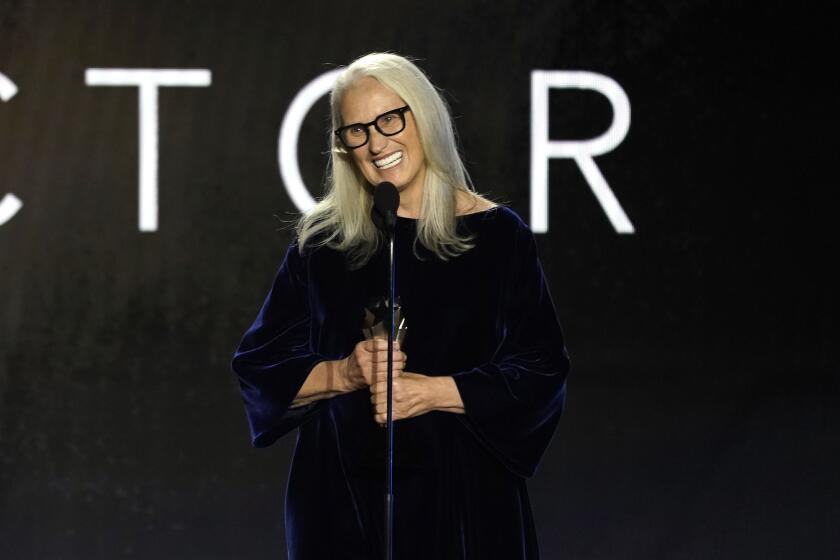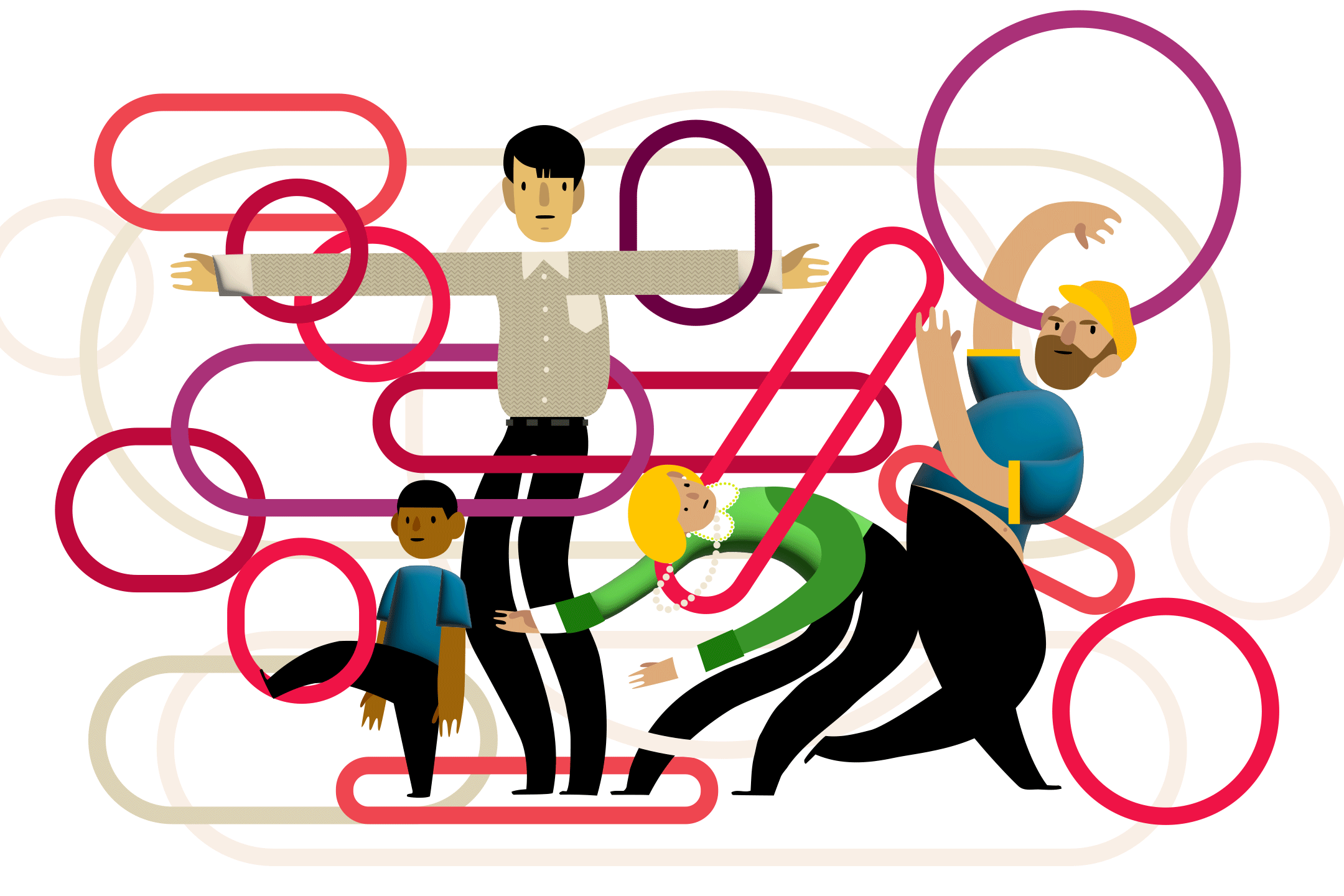- Share via
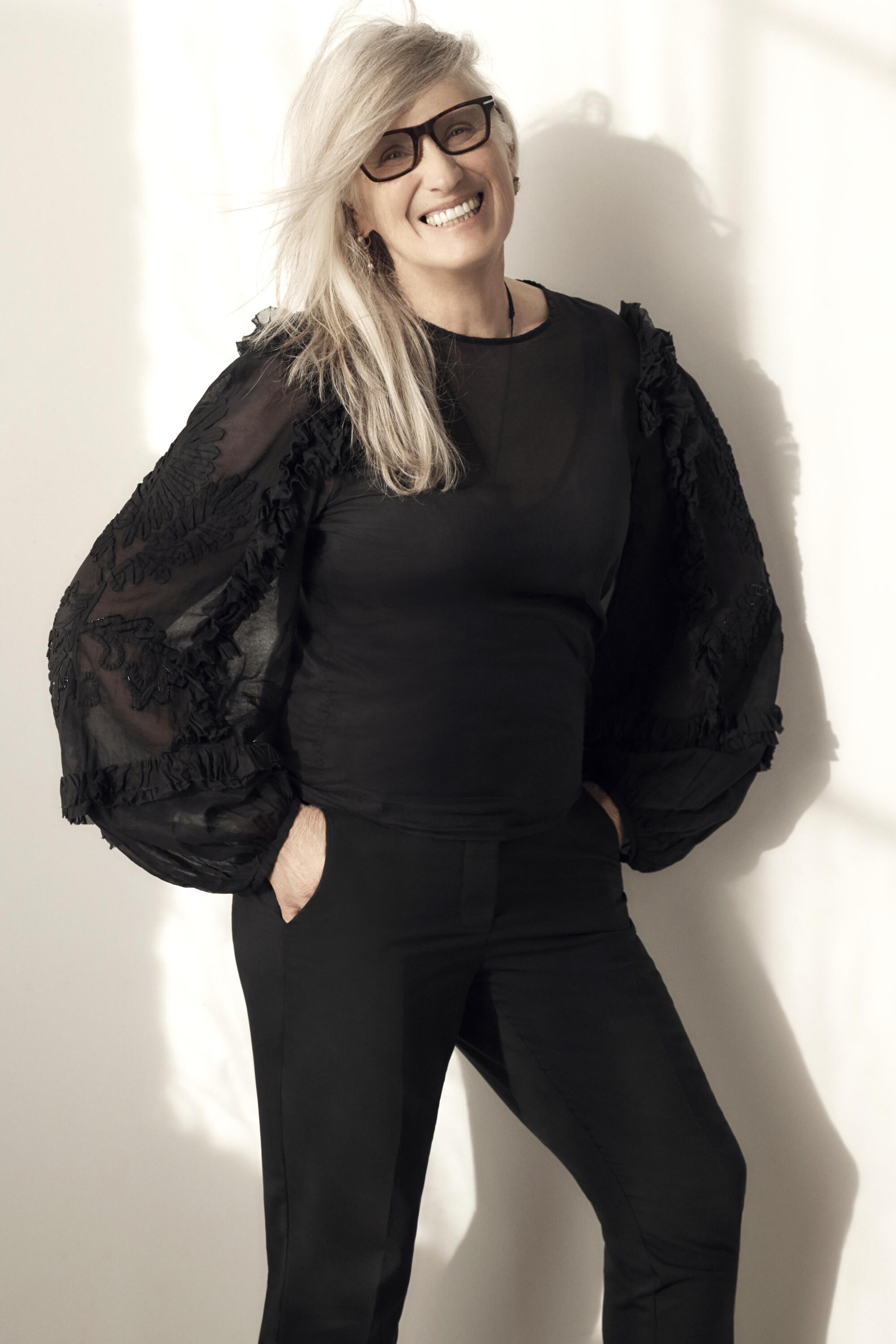
Jane Campion is sitting cross-legged on a yoga mat in the bedroom of her Sydney, Australia, home in late February. Barefoot, wearing faded jeans, she rotates her laptop 360 degrees to give me the nickel tour before returning her laptop’s camera to the perfectly framed background she has chosen — an immense painting of kiwis by New Zealand artist Bill Hammond.
This is Campion’s workspace, more often than not, the place where, reclining on her bed, she’ll open up a plain, high school notebook (“those leather-bound ones give me the creeps,” she says, “like, what you’re writing is too important, so you can’t make mistakes”) and take pleasure in letting her imagination roam and see what comes from it. If she likes what she wrote, she’ll revise it and send it to an assistant who will type it out for her. Computers aren’t her thing; Campion is defiantly analog.
“When people write on computers, they tend to preserve, and they don’t make the revisions that I think everything should go through,” she says.
Prior to the tour, we’d been talking about presence, the quality she most admires in actors. Technique is fine, but Campion wants her actors to feel relaxed and confident in inhabiting their characters so audiences can sink into the story alongside them and believe every moment.
“Al Pacino in ‘The Godfather,’” Campion says, offering an example. “Really, everyone in ‘The Godfather.’ That’s the gold standard of presence, performance and cinema. And when you look back at it, you realize that it’s the Method in its classical, quiet, deep, deepest form. All those people, you totally believe in them. It’s not about how they say their lines. It’s this depth of richness of who they are there.”
“You never can forget Pacino’s intensity,” she continues. “It feels like it’s being formed by a whole life. It’s not the delivery of a snappy line. It’s so much more profound. You invest in the story so much more deeply when you have that trust in them.”
Did you feel that presence in “The Power of the Dog,” Campion’s acclaimed western about smart, self-loathing, bullying cowboy Phil Burbank (played by Benedict Cumberbatch), who terrorizes Rose (Kirsten Dunst), the wife of his quiet brother (Jesse Plemons), until Rose’s delicate son, Peter (Kodi Smit-McPhee), hatches a plan to intervene?
All four of its primary actors earned Oscar nods, as did Campion, who was nominated for directing, producing and adapting the Thomas Savage novel. Her actors cherish her, speaking of their collaboration with reverence and just a little bit of intimidation.
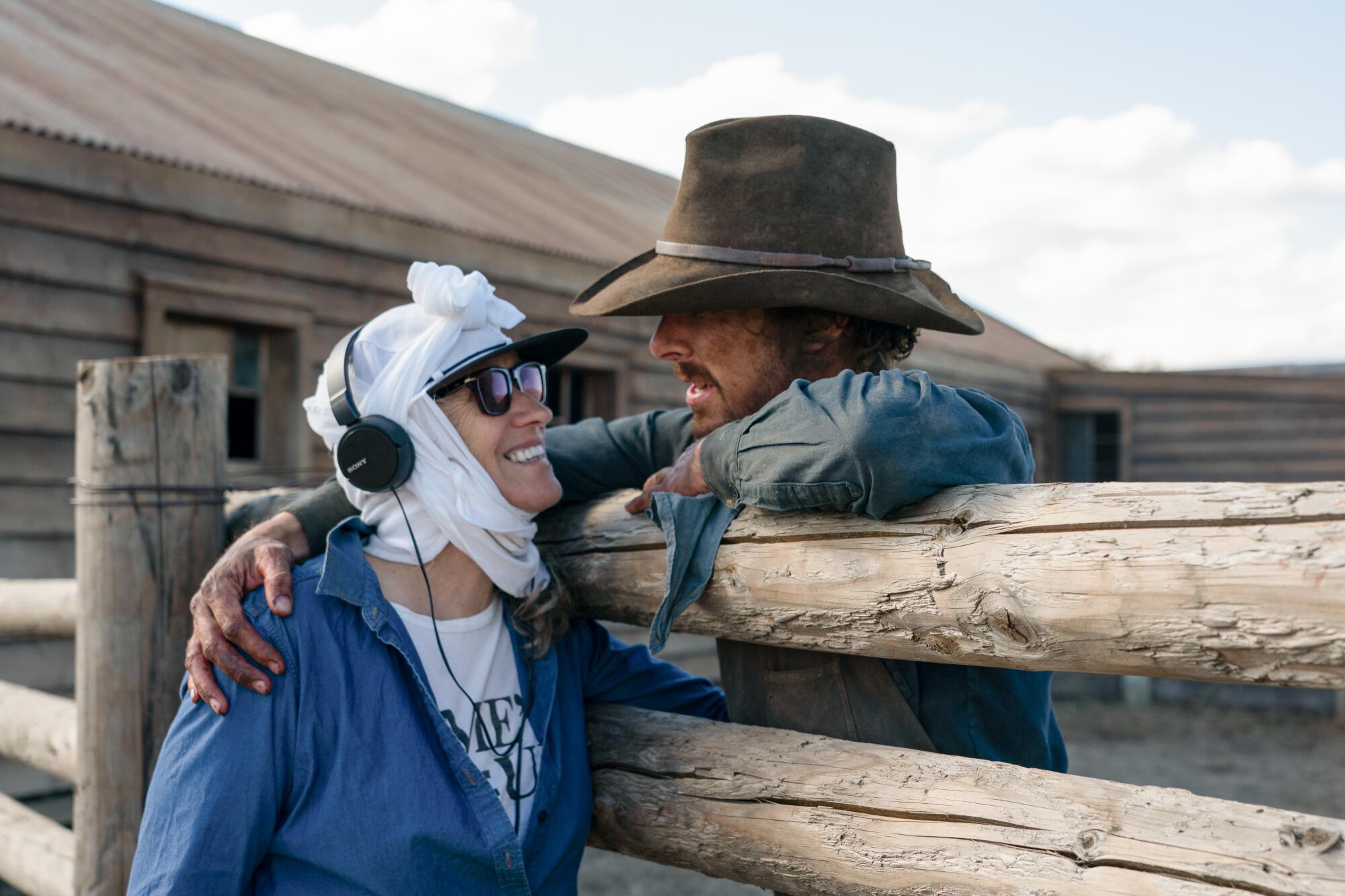
“She provides the tools so you feel like you’re connecting to the character in body and spirit,” Cumberbatch tells me. “And then she patiently waits for you to do the work. Jane is not someone you want to disappoint.”
Campion has won countless prizes for the film, including the top Directors Guild of America honor on Saturday, recognition that arrives nearly three decades after she earned an Oscar for writing “The Piano,” the haunting, provocative 19th century love story starring Holly Hunter.
“It feels like a long time ago, and, of course, it is, so all the attention feels meaningful,” Campion says. “It’s my nature to keep honing what I love, and here it has come to something — or I’m just lucky this time.” She laughs. “I’m grateful that people have met the film in all its complexity and that they’ve gotten involved with the story and its characters.”
There is a complexity to awards season as well, a long cycle of kudos and criticisms, and this year Campion has been caught up in it — twice. Well after our conversation, actor Sam Elliott disparaged the film — and her — on comic Marc Maron’s podcast. And while supporters quickly came to her defense, on Sunday at the Critics Choice Awards, Campion was the one who spoke rashly.
Addressing Venus and Serena Williams while accepting her award, Campion said it was “an honor to be in the room with the Williams sisters,” before adding, “and you know, Serena and Venus, you are such marvels. However, you do not play against the guys like I have to.” On Monday, Campion apologized in a statement to the Los Angeles Times saying, “I made a thoughtless comment equating what I do in the film world with all that Serena Williams and Venus Williams have achieved. I did not intend to devalue these two legendary Black women and world class athletes.”
The “Power of the Dog” director was praised and criticized for remarks she made at awards shows over the weekend.
Before the controversies, Campion says the last few months have taught her how to receive praise with grace. New Zealanders, like Australians, Campion notes, despise pretension, a quality that courses through the awards season. It has taken a shift in mind-set, but she has been able to step back and appreciate the fact that she has inspired women with her trailblazing career.
“Really, though, I probably won’t know what to think about this for another five years,” Campion says. “That was the case with ‘The Piano.’ It took me five years to realize, ‘Oh, that’s pretty unusual to get that reception for a film.’” She laughs. “I think people are very impressed by Oscars. To me, the Oscars is a great way of creating a conversation about cinema that everybody invests in and helps keep the profile of cinema high and interesting.
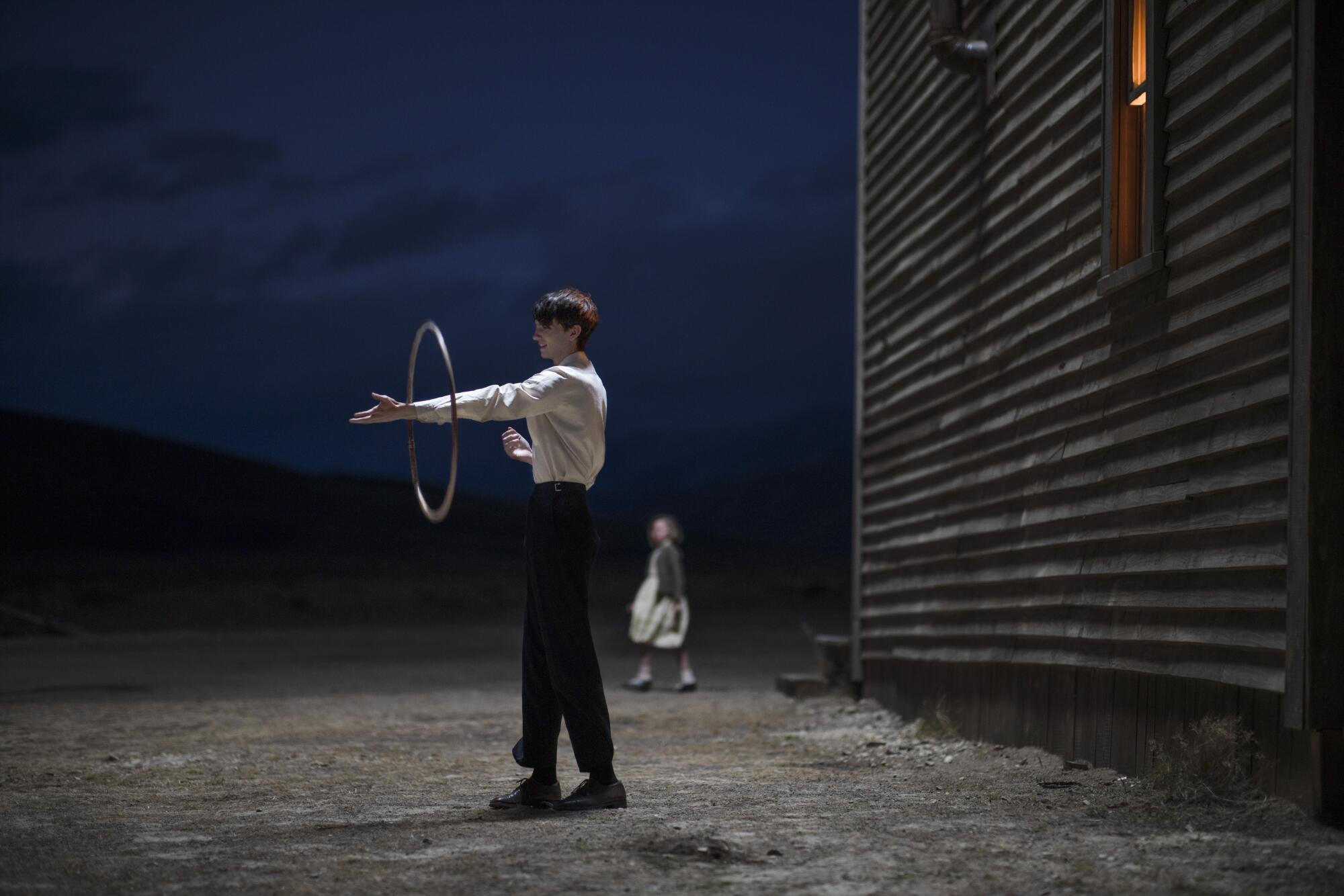
“To me, that’s the real truth of it. Sometimes I agree with what wins, and sometimes I don’t. But people take it very much to heart you’re immediately someone special if you’ve won one.”
What has changed since “The Piano” is that Campion feels less alone. Back then, nearly everyone asked her how it felt to be a female filmmaker in the motion picture industry. She doesn’t miss that question.
“That is a way of creating a ghetto for women that we don’t appreciate,” Campion says. “We’re just filmmakers and artists, and I don’t think the gender aspect is the most important aspect of what we do. Yes, it has been a barrier. But women aren’t any different in how they make their movies. The focus should be on who they are as artists, and it’s refreshing to see that is, more often than not, the case now.”
Campion, then, has relished moviegoers’ questions about “The Power of the Dog” and its place in her career. [Note: Spoilers ahead.] In the wake of Peter murdering Phil at the end of the film, does she agree with Cumberbatch’s assessment that George might be next? “Get Mommy by himself?” Campion muses. “I don’t think that’s Peter’s plan. I think he wants Mommy married off so he can start his own interesting life. He’ll probably start a philanthropic society and become a rich, important man.”
Does she buy into Smit-McPhee’s theory that Peter hatched his murder scheme the moment Phil burned his paper flowers in the restaurant? “I think that’s nice for Kodi to decide in his mind. I believe Peter decides to take action once he sees his mother talking incoherently and he realizes she’s lost.”
Is she OK with people who believe Peter’s mad hula hoop skills are anachronistic to the setting? Campion laughs.
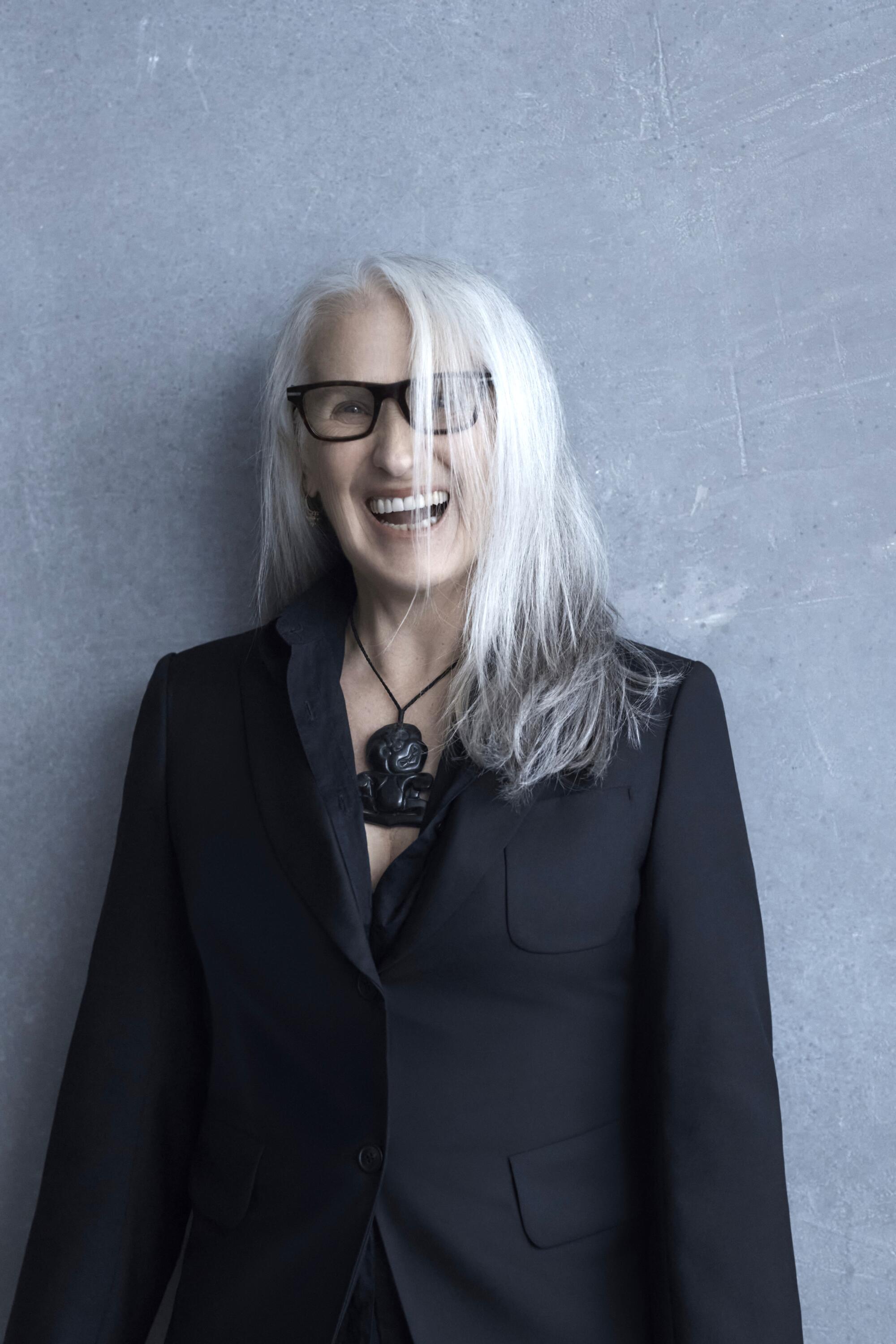
“[Writer] Annie Proulx, who I worship, asked me, ‘What’s the hula hoop doing here?’” Campion remembers. “She thought it was a complete mistake. But hula hoops had been in the world for a very long time before they became popular in the ‘40s and ‘50s. Kodi saw it and grabbed it in the rehearsal room, and it just looked right to me that this boy worked out some of his frustrations this way. He goes out, and the little girl is looking at him like, ‘You’re not right.’”
The hoop toy can be seen on screens big and small. Consider ‘Power of the Dog,’ ‘Spencer,’ ‘Hand of God’ and even ‘Ted Lasso.’
Campion is particularly pleased with all the talk about the last scene in the film, in which Peter caresses the rope he made with Phil and then places it underneath the bed as a keepsake. Originally, the script had Peter making a paper flower, a callback to the character’s introduction. But when the film shut down at the beginning of the pandemic, Campion rewrote the scene to emphasize the rope and the bond it symbolized between the two men.
“That rope is so freighted with their friendship and with the night that it was completed and also the fact that it becomes a murder weapon,” Campion says. “There’s a lot going on with that rope!”
More to Read
From the Oscars to the Emmys.
Get the Envelope newsletter for exclusive awards season coverage, behind-the-scenes stories from the Envelope podcast and columnist Glenn Whipp’s must-read analysis.
You may occasionally receive promotional content from the Los Angeles Times.
